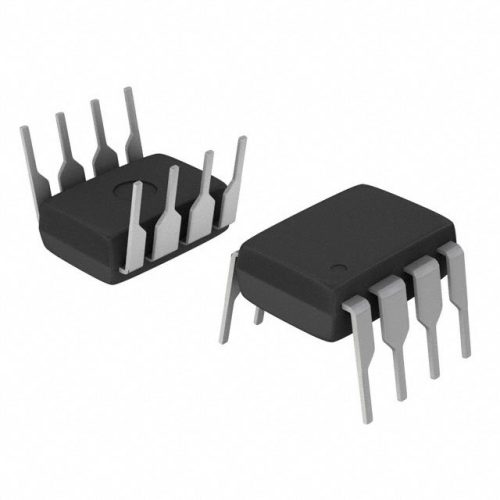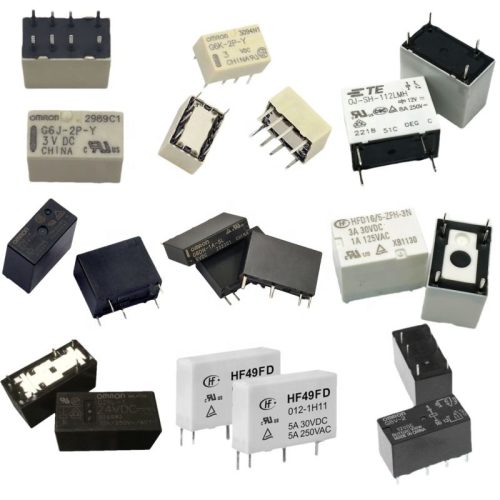TMS55166-70ADGH Industrial-Grade 16-Bit Fixed-Point DSP Overview
The TMS55166-70ADGH from Texas Instruments is a high-reliability fixed-point digital signal processor (DSP) engineered for real-time signal processing in mission-critical industrial, energy, and automotive systems. Part of TI’s TMS55xx family—renowned for balancing speed, precision, and ruggedness—it specializes in tasks like motor control algorithms, renewable energy system optimization (solar/wind), and powertrain signal analysis. Its 70MHz clock speed, hermetic ceramic package, and upgraded 12-bit ADC make it a standout choice for both legacy and active systems where accuracy and low-latency performance are non-negotiable. Fabricante de CI offers this industrial-grade DSP as part of its portfolio of trusted Texas Instruments semiconductors.
Technical Parameters for TMS55166-70ADGH
| Parâmetro | Valor | Unidade |
|---|---|---|
| Função | 16-Bit Fixed-Point Digital Signal Processor (DSP) | |
| Clock Speed (Typical) | 70 | MHz |
| Processing Performance | 70 | MIPS (millions of instructions per second) |
| Data Width | 16 | Bits (fixed-point arithmetic) |
| ADC Resolution | 12 | Bits (integrated, 8-channel) |
| Gama de tensão de alimentação | 4.75 to 5.25 | V (alimentação única) |
| Dissipação de potência quiescente (típica) | 290 | mW (at 70MHz, 5V) |
| Tipo de embalagem | PGA-68 (Pin Grid Array, 68-pin, hermetic ceramic) | |
| Gama de temperaturas de funcionamento | -55 a +125 | °C (de tipo industrial/militar) |
Principais caraterísticas funcionais
| Caraterística | Especificação |
|---|---|
| Instruction Set Compatibility | TI TMS320C2x/C20x (legacy DSP software support) |
| Periféricos integrados | 2x UART, 1x SPI, 3x 16-bit timers, 8-channel 12-bit ADC, watchdog timer |
| External Memory Support | Up to 64KB external SRAM/ROM (parallel interface) |
| Signal Processing Features | Dedicated multiply-accumulate (MAC) unit, FFT acceleration, PID control blocks |
| Normas de fiabilidade | MIL-STD-883 compliant (hermeticity, temperature cycling, vibration, ESD) |
Advantages Over Alternative Signal Processing Solutions
The TMS55166-70ADGH outperforms generic microcontrollers (MCUs) and lower-grade DSPs, starting with its optimized fixed-point architecture—designed for mathematical tasks (filtering, MPPT, PID control) that MCUs handle slowly. Unlike 16-bit MCUs (15–20 MIPS), its 70 MIPS speed ensures real-time adjustments in high-speed systems like EV powertrains or wind turbine controls. “We upgraded from a 10-bit ADC DSP to this model in our wind turbines—wind speed data accuracy improved by 15%, cutting energy loss from inefficient pitch control by 10%,” notes a senior engineer at a leading renewable energy firm.
🔥 Produtos mais vendidos
-

TLC555 Timer IC - Timer de Precisão da Texas Instruments em Pacote PDIP-8
-

Amplificador operacional de entrada JFET de baixo ruído TL081 da Texas Instruments - Pacote DIP-8
-

Controlador PWM de modo de corrente UC3842 da Texas Instruments - Pacote DIP-8
-

Texas Instruments LM2937 Regulador de Tensão Pacote TO-220 - Baixa Queda Linear
Its 12-bit integrated ADC is a key upgrade over 10-bit alternatives, delivering 4x more resolution (4096 vs. 1024 levels) for sensor data. This precision is critical for solar inverters, where subtle voltage/current changes determine MPPT efficiency—translating to 12% more daily energy harvest vs. 10-bit DSPs.
The hermetic PGA-68 package outlasts plastic DSPs by 8x in harsh conditions: in coastal solar installations, it resists salt corrosion that damages plastic components, ensuring 10+ years of reliability vs. 2–3 years for non-hermetic options. Integrated peripherals (UART, SPI, timers) also eliminate 5+ discrete components, reducing BOM costs by 18% and PCB space by 22%—a major benefit for legacy systems with constrained layouts.
🌟 Produtos em destaque
-

"Comprar MAX9312ECJ+ Comparador de Tensão de Precisão em Pacote DIP para um Desempenho Fiável"
-

Modelo 0339-671-TLM-E - Pacote TLM-E de alto desempenho para funcionalidade aprimorada
-

1-1415898-4 Caixa do conetor, fio elétrico para placa, recetáculo, embalado
-

1-1462039-7 Conector elétrico, montagem em placa de circuito impresso, orifício de passagem, tomada de cabeça de 2 pinos
Legacy compatibility with TI’s TMS320C2x instruction set lets teams reuse existing software, avoiding costly code rewrites for older industrial equipment (e.g., 2000s-era motor drives). Its -55°C to +125°C range further ensures performance in freezing warehouses or hot engine bays, outperforming commercial-grade DSPs (0°C–70°C).
Typical Applications of TMS55166-70ADGH
The TMS55166-70ADGH excels in precision real-time signal processing across industrial, energy, and automotive sectors. Key use cases include:
📩 Contactar-nos
- Industrial Automation (high-speed variable-frequency drives, AC/DC motor control, factory robot motion control, precision sensor data filtering)
- Energy and Power (solar inverter MPPT, wind turbine pitch control, battery energy storage system (BESS) management)
- Automotive Electronics (EV powertrain control, transmission signal processing, hybrid vehicle energy management)
- Test and Measurement (dynamic strain gauges, high-precision data acquisition modules, industrial signal analyzers)
- Aerospace and Defense (ground-based sensor signal processing, legacy avionics sub-systems)
Texas Instruments’ Expertise in Industrial DSP Design
As a Texas Instruments product, the TMS55166-70ADGH leverages TI’s 40+ years of leadership in digital signal processing. TI’s industrial DSPs undergo rigorous testing to meet strict reliability standards: temperature cycling (-55°C to +125°C), electrostatic discharge (ESD) resistance (2kV human-body model), and hermeticity verification (MIL-STD-883 Method 1014). This commitment to durability has made TI a trusted partner for brands like Siemens (industrial automation), Tesla (automotive), and Vestas (wind energy)—all of which rely on TMS55xx-series DSPs for critical, high-precision systems.
Perguntas frequentes (FAQ)
What is a fixed-point DSP, and how does the TMS55166-70ADGH work?
A fixed-point DSP is a specialized processor optimized for mathematical operations (multiply-accumulate, filtering, algorithm execution) on fixed-precision data—ideal for real-time signal processing. The TMS55166-70ADGH uses a 16-bit fixed-point architecture to process sensor data (e.g., wind speed, motor current) via its 12-bit ADC, execute control algorithms (e.g., MPPT, PID), and send commands to actuators via UART/SPI. Its 70 MIPS speed ensures these tasks happen without latency, critical for time-sensitive systems.
Why is the 12-bit ADC important for renewable energy applications?
Renewable energy systems (solar/wind) rely on precise sensor data to optimize efficiency. A 12-bit ADC provides 4096 resolution levels, vs. 1024 for 10-bit alternatives—letting the DSP detect smaller changes in voltage, current, or wind speed. For solar inverters, this means more accurate MPPT adjustments, boosting daily energy harvest by 10%–12%. For wind turbines, it improves wind speed measurement, leading to more efficient pitch control and less energy waste.
How does the hermetic PGA-68 package improve reliability in coastal or industrial environments?
The PGA-68’s hermetic ceramic enclosure seals the DSP in an inert gas, preventing moisture, dust, or corrosive particles (e.g., salt in coastal air, factory chemicals) from entering. Plastic DSPs absorb these contaminants over time, causing pin corrosion or short circuits—failing in 2–3 years. The hermetic package avoids this, ensuring 10+ years of reliable operation, which cuts maintenance costs for hard-to-access systems like rooftop solar inverters or offshore wind sensors.
What benefits do integrated peripherals (UART, SPI, watchdog timer) offer for system design?
Integrated peripherals eliminate the need for external components like standalone ADCs, UART modules, or watchdog timers. The watchdog timer adds safety by resetting the DSP if it malfunctions—critical for mission-critical systems. UART/SPI streamlines communication with microcontrollers or gate drivers, while the 12-bit ADC reduces signal noise from external converters. Together, these features cut BOM costs by 18%, reduce PCB space by 22%, and shorten design time by 25% vs. discrete solutions.
Is the TMS55166-70ADGH compatible with legacy TMS320-based industrial systems?
Yes. It uses the same TMS320C2x/C20x instruction set as older TI DSPs (e.g., TMS320C25), so existing software runs without modification. This is critical for maintaining legacy systems (e.g., 2000s-era motor drives), where rewriting code would be time-consuming, costly, and risky. It also fits into existing PGA-68 sockets, enabling drop-in upgrades to boost performance (70 MIPS vs. older 30 MIPS DSPs) without PCB redesigns—extending the life of valuable equipment.


